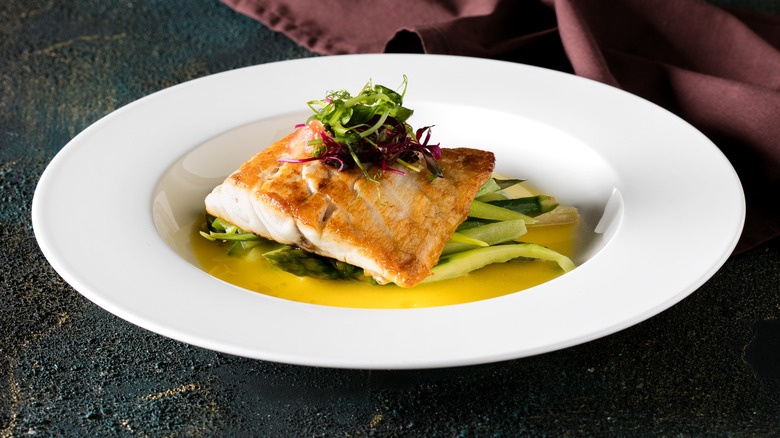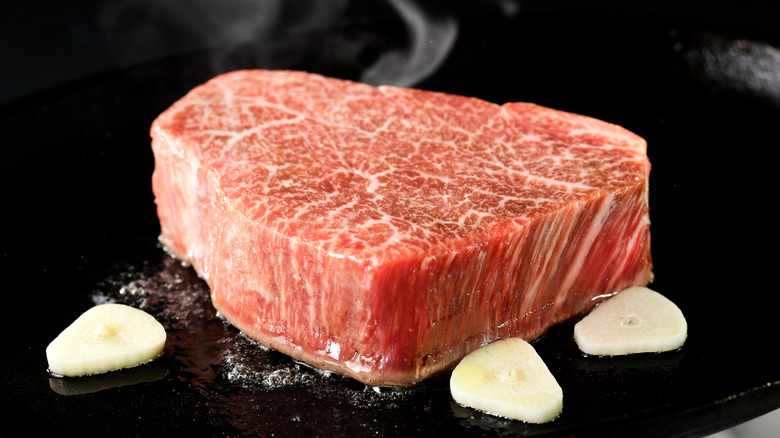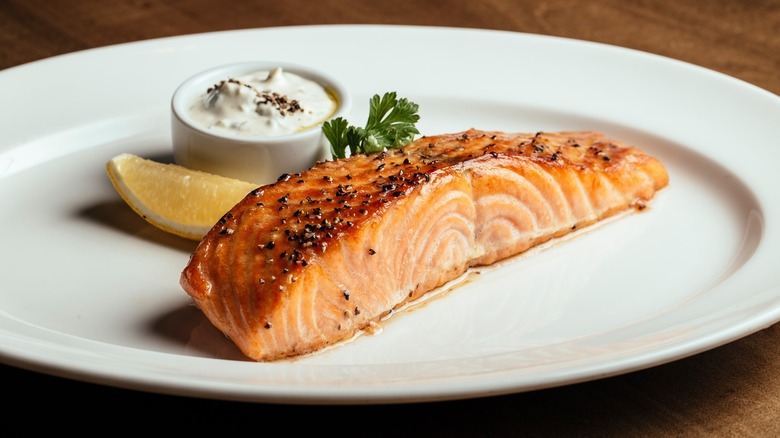The Salmon Variety Chefs Call 'The Wagyu Of The Sea'
Ah, salmon! They live in both the Atlantic and Pacific oceans, weigh up to 80 pounds in some cases yet only average 10 pounds, and famously love to swim upstream before spawning (via Encyclopedia Britannica). What more needs to be said? Well, while some notably like to hunt salmon for sport, what we're really interested in here is the commercial catching and farming of the fish.
Salmon possess a lot of culinary potential. As explained by Food Network, Atlantic salmon are typically farm-raised, meaning they're consistently available and of reliable quality. Meanwhile, Pacific salmon are usually wild-caught, hitting the store in the summer, yet varying in freshness. Some of the more common varieties you'll see at the market are the Pink, Keta, and Coho salmon, while the Sockeye and King salmon (both wild species) are the choicest. If cooked right — baked, grilled, or pan-fried — good salmon will end up with crispy skin and tender meat.
The best salmon will taste so delicious, it can be considered the Wagyu (or even Kobe beef) of the sea!
The meaning of Wagyu
What exactly do we mean by "Wagyu?" Briefly veering from surf to turf, "Wagyu" quite literally means "Japanese beef," per BBC Good Food, and it generally refers to the high quality of cow meat hailing from Japan. Such protein is buttery soft, noticeably marbled, and very expensive, but most agree the juicy flavor is well worth it.
As noted by the American Wagyu Association, this luxurious taste and texture is the result of careful breeding practices. Japanese cows have long been used as beasts of burden. As a result, cows with more intramuscular fat, aka marbling, thrived and thus proliferated in the island nation. Furthermore, with a few exceptions, the Wagyu population is isolated from foreign breeds, thus preserving its unique characteristics. Those cows are also kept well-fed in stress-free environments in order to make sure every specimen is up to culinary standards.
So, which salmon variety can match Wagyu's reputation?
Ora is the King Salmon
"People order it well-done, start eating, and ask how it can still be buttery inside," Pawan Pinisetti, former executive chef of Las Vegas' Top of the World restaurant, once told Food & Wine. "Get this fish with a pink center, and it is really something else. It's the Wagyu of the sea."
Pinisetti was describing none other than Ora King salmon. King salmon is usually wild-caught, but this particular variety is farm-raised in New Zealand to give it a nice 25% fat-to-lean ratio. This results in succulently rich, reddish-orange meat with a Wagyu-marble appearance. A lot like Japanese beef, Ora King also costs a pretty penny, but it too is worth the price. Even home chefs can get in on the expensive yet delectable fun, since Ora King salmon is now sold by retailers for fresh delivery.
Farm-raised fish can sometimes be less than sustainable, admittedly, but Ora King Salmon strives for excellence in its operations. Its salmon are reared in fresh spring water and then raised in fast-flowing seawater, which mimics the wild. These fish are also selectively bred (for more than nine generations now) and fed a special diet of oils and veggie protein. This carefully calibrated lifestyle allows for consistency in products, so customers always know what they're getting. Plus, for those wishing to go big or go home, chefs can order tyee — Ora King salmon that naturally grows extraordinarily large.
It would seem Wagyu has met its nautical yet beefy match.


